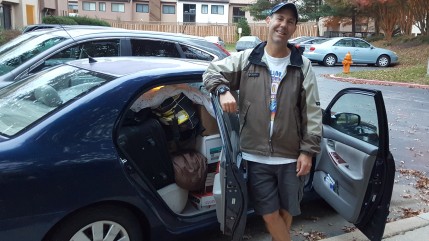Ramblin’ Man
For the second time in my adult life, I loaded all my possessions I could fit in a compact car and traveled more than 500 miles to a new city in a new state to begin a new career and concomitantly, a new life.
Two small differences were that the first time, I drove a Honda Civic from Washington, D.C. to Florida; the second time, a Toyota Corolla from Maryland to South Carolina.
A bigger difference is that the first time I was 22 and just starting out in life, the future stretched out before me like the unending Eastern Seaboard expanse of Interstate 95 that I trekked to Florida, with few obligations or attachments. If the world wasn’t yet exactly my oyster, I had what seemed an eternity to search for pearls.
This time, I was 54, acutely aware of entering the latter stages of my career and wanting to make it inspired, with long-standing financial, material, family, friendship and community ties from nearly three decades in the Baltimore-Washington region. Quite simply, there was more riding on my decision – more people to potentially disappoint or who would disapprove; more things to give up; a sense of security and stability that comes with comfort and familiarity to be shattered; greater doubts and fears about starting anew in midlife to be conquered.
Moving is never easy, especially when relocating as far away as I have, from Maryland to the Charleston area of South Carolina, far enough to truly be gone. I feel like I’ve made a highly unconventional decision to upend my life at this midlife stage, gone against the grain. Indeed, demographic studies and surveys say I have.
While the United States is widely viewed as a land of boundless geographic mobility, with its heritage of explorers braving the Wild West frontiers and searching for their fortune in gold, the truth is, many Americans never venture more than a half-hour from their hometowns to live. Most Americans, especially from certain demographic groups, are stayers, not movers.
- A 2015 University of Michigan Health and Retirement Study found that the typical adult – half the population — lives within 18 miles of his or her mother, and only 20 percent live more than a few hours’ drive from their parents. The study showed that over the last few decades, Americans are staying put at higher rates, with multiple generations remaining close to relatives for financial and logistical support. Those with college educations and higher incomes are more likely to live farther from their parents.
- A 2015 Allstate/National JournalHeartland Monitor poll determined that more than half of respondents lived in close proximity to where they grew up. The percentage of stayers was highest for people from rural areas and small towns. Nearly half of all respondents had lived in the same area for 21 years or more. The pull to stay put is strong: Less than half of the respondents who believed that their hometown regions were on the downswing economically nevertheless said that the possibility of a move was not likely for them.
- A 2008 Pew Research Center survey found that nearly 40 percent of Americans had never left the hometown region in which they were born, and 57 percent had never lived in a state other than the state in which they were born. Those who moved most often cited greater economic opportunity; the main influencers for stayers were family, established connections, and a sense of belonging.
Anecdotally, it seemed to me that people in my demographic group – college educated suburban or urban dwellers — moved around in early adulthood as they established careers, sought better opportunities, climbed work and social ladders and started families. But once they entered that next stage, middle adulthood, they seemed to stay put for decades until retirement, in their 60s or 70s, or beyond.
Beyond the pull of family, connections, familiarity and a sense of belonging, a big reason few people move in midlife is that it’s just plain hard, especially emotionally. It’s a gamble, as much as one tries to predict and reduce the risk through analysis, projection and planning. I’m experiencing that now, just completing the first two weeks in my adopted new South Carolina hometown. Everything is new; nothing is known. I can’t sit back and wait for things to happen; I have to make them happen. It takes energy, effort and openness. It requires being outgoing, to meet new people, forge relationships with work colleagues and get involved in things I like to do. It involves learning and adapting to a new culture – as my boss jokes: “get used to guns and fried chicken.”
It can be lonely – extremely lonely. I relocated to a region where I have no friends or family. Some may call this decision a mistake, a dumb move, a misguided effort to search for where “the grass is greener.”
I certainly have misgivings. I have given up a lot, and that weighs on me. I still don’t know how some things will turn out because of my decision. I almost abandoned the idea of moving many times, but an urge wouldn’t let me. I made a gut decision based on seeking a change of environment after 30 years; an opportunity where I would perhaps be a larger fish in a smaller pond in my new counseling career, thus increasing business prospects; and a place that offered a lifestyle and culture that I believed I would enjoy potentially for the rest of my working life and thereafter. The short-term adjustment challenges would have long-term benefits in quality of life and career satisfaction, I gambled. Still, it was hard to pull the trigger and yank up stakes.
But the angst is counterbalanced by the excitement, renewal, opportunity and sense of adventure that comes with starting fresh in a new place. It’s a chance to recharge batteries and create something from scratch, to expand my universe and experiences, to grow and learn and build confidence, to stretch beyond the known and test myself.
For me, with memories of pulling into my retired distant relatives’ house in Longboat Key, Florida in the dark after a 20-hour journey to start a new life as a 22-year-old sportswriter still vivid in my mind, those affirmatives made it worth going back to the future.

 burying the hurt, anger, disappointment, sadness or other negative emotions until one day they boil over and surface in a torrent, providing release for the emotional-baggage carrier and a knockdown punch for the recipient of the pent-up emotions, unaware of the depth and intensity of feelings. I’ve been on both the unleashing and receiving ends of the bubbling emotional volcanos, and it’s never pretty.
burying the hurt, anger, disappointment, sadness or other negative emotions until one day they boil over and surface in a torrent, providing release for the emotional-baggage carrier and a knockdown punch for the recipient of the pent-up emotions, unaware of the depth and intensity of feelings. I’ve been on both the unleashing and receiving ends of the bubbling emotional volcanos, and it’s never pretty.